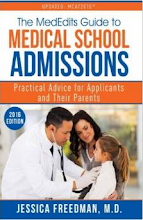The Importance of Away Rotations in Medical School
By Jessica Freedman, MD, MedEdits
If you are a rising 4th year medical student, you should be seeking out away elective rotations in your desired specialty. Many students worry that doing away electives at a program they would like to attend could do more damage than good. However, unless you have a poor performance, even someone who is perceived as slightly above average as a visiting student might be ranked higher than a student with similar stats and has not worked in the department. When I was the associate residency director, I always preferred to rank highly a student who was a "known entity" and had a predictable performance rather than a student whom I didn't know.
What can you do to ensure that you are perceived in the best light during your away rotations?
1) Show up early and stay late.
2) Work harder than you have on any other rotation. Do not plan to have much free time during this rotation.
3) Read about your cases.
4) Be professional and confident (but not over-confident).
5) Be independent and a help to the residents and attending on your team; you want to be perceived as a true team player.
6) Treat everyone well -- your fellow students, residents, nurses, staff and, of course, your attending(s).
7) Go to every conference and be sure to introduce yourself to the program director if s/he is not the attending on service.
I am now working with clients for the 2014/2015 match season. Many students need supplemental guidance or advising while in medical school and throughout the residency application process. If you would like to work with us this year, I encourage you to contact me soon. As a private medical educational advisor, I work one on one with students and play the same role as I did when I worked in a formal academic setting at Mount Sinai in New York City.
If you are a rising 4th year medical student, you should be seeking out away elective rotations in your desired specialty. Many students worry that doing away electives at a program they would like to attend could do more damage than good. However, unless you have a poor performance, even someone who is perceived as slightly above average as a visiting student might be ranked higher than a student with similar stats and has not worked in the department. When I was the associate residency director, I always preferred to rank highly a student who was a "known entity" and had a predictable performance rather than a student whom I didn't know.
What can you do to ensure that you are perceived in the best light during your away rotations?
1) Show up early and stay late.
2) Work harder than you have on any other rotation. Do not plan to have much free time during this rotation.
3) Read about your cases.
4) Be professional and confident (but not over-confident).
5) Be independent and a help to the residents and attending on your team; you want to be perceived as a true team player.
6) Treat everyone well -- your fellow students, residents, nurses, staff and, of course, your attending(s).
7) Go to every conference and be sure to introduce yourself to the program director if s/he is not the attending on service.
I am now working with clients for the 2014/2015 match season. Many students need supplemental guidance or advising while in medical school and throughout the residency application process. If you would like to work with us this year, I encourage you to contact me soon. As a private medical educational advisor, I work one on one with students and play the same role as I did when I worked in a formal academic setting at Mount Sinai in New York City.
Visit www.MedEdits.com to schedule your session.





















